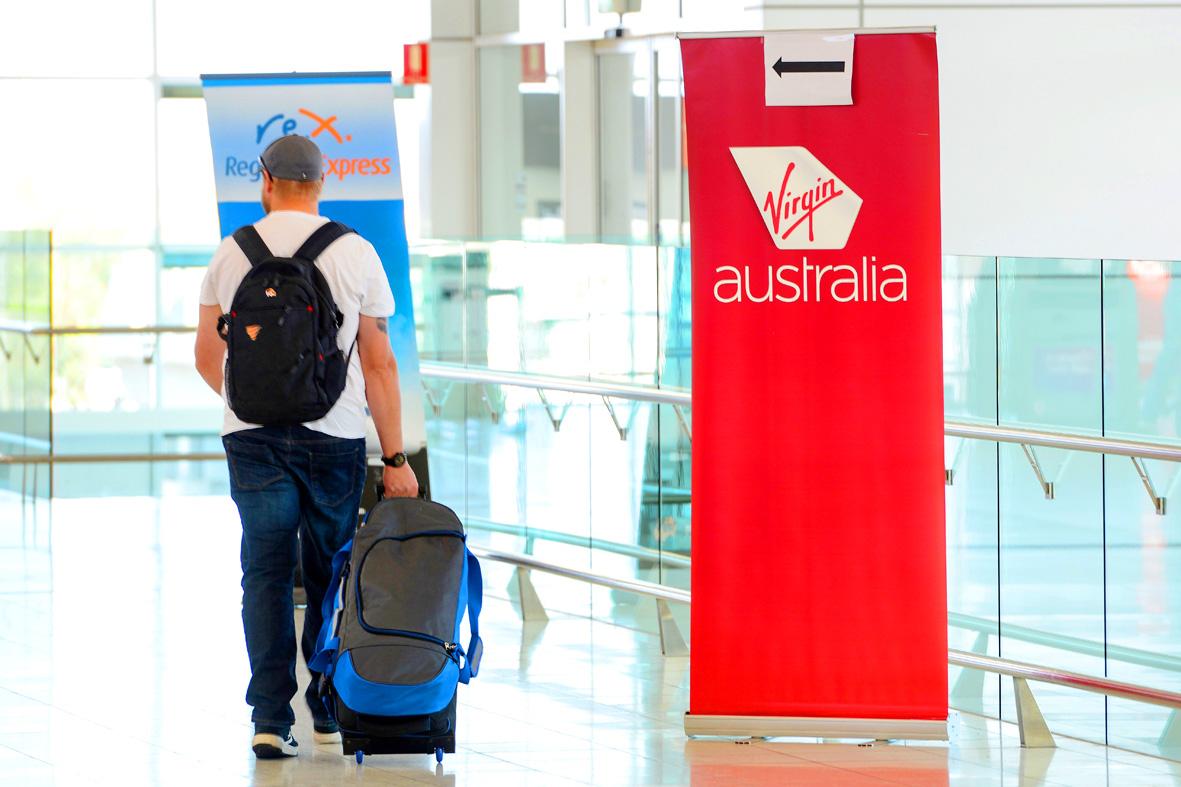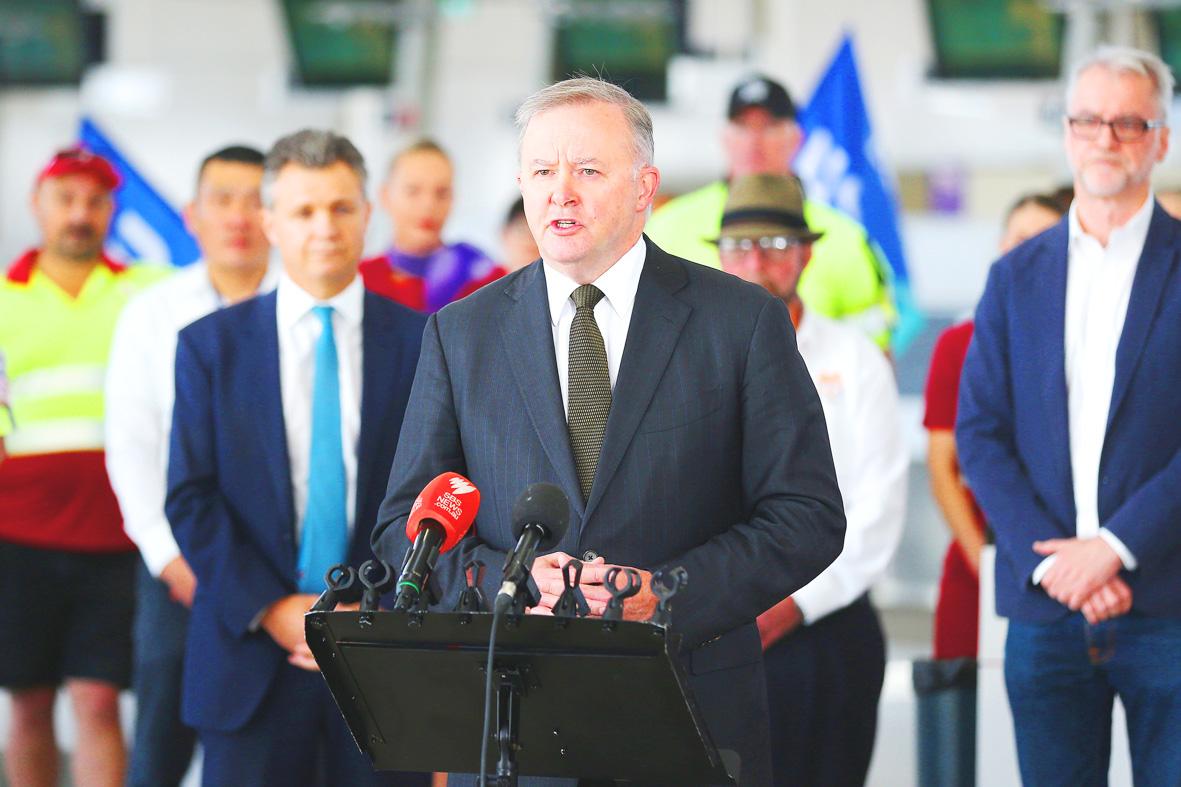Virgin Australia Holdings Ltd, Australia’s second-largest airline, yesterday announced it had entered voluntary administration as it seeks to strengthen its finances amid a debt crisis.
Virgin said in a statement to the Australian Securities Exchange that it had appointed a team of Deloitte administrators to “recapitalize the business and help ensure it emerges in a stronger financial position on the other side of the COVID-19 crisis.”
Virgin is one of the first major airlines to seek bankruptcy protection in response to the pandemic. Virgin’s administrators have taken control of the company and will try to work out a way to save either the company or its business.

Photo: AFP
The move came after the Australian government refused Virgin’s request for an A$1.4 billion (US$888 million) loan.
Rival Qantas Airways Ltd argued that it had three times more revenue than Virgin and was therefore entitled to an A$4.2 billion loan if the smaller airline was not to gain an unfair advantage.
“Our intention is to undertake a process to restructure and refinance the business and bring it out of administration as soon as possible,” administrator Vaughan Strawbridge said in the statement.

Photo: Bloomberg
Virgin would continue to operate its scheduled international and domestic flights, the vast majority of which have been canceled due to the COVID-19 pandemic.
Virgin is struggling to repay A$5 billion in debt after several loss-making years.
Some analysts predict that if the airline survives, it will drop international services and focus on the Australian domestic market.
Virgin Australia’s major shareholders are Singapore Airlines Ltd and Etihad Airways PJSC as well as Chinese investment conglomerates Nanshan Group Co (南山集團) and HNA Group Co (海航集團). British billionaire founder Richard Branson holds a 10 percent stake.
The Australian government and businesses fear that a collapse of Virgin would leave Qantas with a virtual monopoly in the domestic aviation market.
Australian Prime Minister Scott Morrison said he was encouraged that “10 parties have shown interest” in Virgin’s future and have approached administrators to discuss financial deals.
“If we’d not taken the actions that we have and not demonstrated the patience that we have, then all we may have ended up doing is sending A$1 billion to foreign shareholders and that was never part of my plan,” Morrison told reporters.
“Our plan was always about seeing two viable airlines on the other side,” he added.
Virgin filled a gap left when Qantas’ former main domestic rival, Air New Zealand-owned Ansett Australia, collapsed in 2001.
Brisbane-based Virgin has 130 aircraft and employs 10,000 staff.
Opposition lawmakers and union leaders called for the government to bail out Virgin to save jobs and low-price domestic airfares.
“This crisis isn’t a result of market failure, it’s a result of a government decision to shut the market,” opposition Labor Party leader Anthony Albanese said. “That’s why talk of market-based solutions at the moment is a triumph of ideology over common sense.”
In the US, major airlines are getting US$25 billion in government aid to pay workers and avoid massive layoffs. The assistance includes a mix of cash and loans, with the government getting warrants that can be converted into small ownership stakes in the leading airlines.

With an approval rating of just two percent, Peruvian President Dina Boluarte might be the world’s most unpopular leader, according to pollsters. Protests greeted her rise to power 29 months ago, and have marked her entire term — joined by assorted scandals, investigations, controversies and a surge in gang violence. The 63-year-old is the target of a dozen probes, including for her alleged failure to declare gifts of luxury jewels and watches, a scandal inevitably dubbed “Rolexgate.” She is also under the microscope for a two-week undeclared absence for nose surgery — which she insists was medical, not cosmetic — and is

CAUTIOUS RECOVERY: While the manufacturing sector returned to growth amid the US-China trade truce, firms remain wary as uncertainty clouds the outlook, the CIER said The local manufacturing sector returned to expansion last month, as the official purchasing managers’ index (PMI) rose 2.1 points to 51.0, driven by a temporary easing in US-China trade tensions, the Chung-Hua Institution for Economic Research (CIER, 中華經濟研究院) said yesterday. The PMI gauges the health of the manufacturing industry, with readings above 50 indicating expansion and those below 50 signaling contraction. “Firms are not as pessimistic as they were in April, but they remain far from optimistic,” CIER president Lien Hsien-ming (連賢明) said at a news conference. The full impact of US tariff decisions is unlikely to become clear until later this month

GROWING CONCERN: Some senior Trump administration officials opposed the UAE expansion over fears that another TSMC project could jeopardize its US investment Taiwan Semiconductor Manufacturing Co (TSMC, 台積電) is evaluating building an advanced production facility in the United Arab Emirates (UAE) and has discussed the possibility with officials in US President Donald Trump’s administration, people familiar with the matter said, in a potentially major bet on the Middle East that would only come to fruition with Washington’s approval. The company has had multiple meetings in the past few months with US Special Envoy to the Middle East Steve Witkoff and officials from MGX, an influential investment vehicle overseen by the UAE president’s brother, the people said. The conversations are a continuation of talks that

CHIP DUTIES: TSMC said it voiced its concerns to Washington about tariffs, telling the US commerce department that it wants ‘fair treatment’ to protect its competitiveness Taiwan Semiconductor Manufacturing Co (TSMC, 台積電) yesterday reiterated robust business prospects for this year as strong artificial intelligence (AI) chip demand from Nvidia Corp and other customers would absorb the impacts of US tariffs. “The impact of tariffs would be indirect, as the custom tax is the importers’ responsibility, not the exporters,” TSMC chairman and chief executive officer C.C. Wei (魏哲家) said at the chipmaker’s annual shareholders’ meeting in Hsinchu City. TSMC’s business could be affected if people become reluctant to buy electronics due to inflated prices, Wei said. In addition, the chipmaker has voiced its concern to the US Department of Commerce